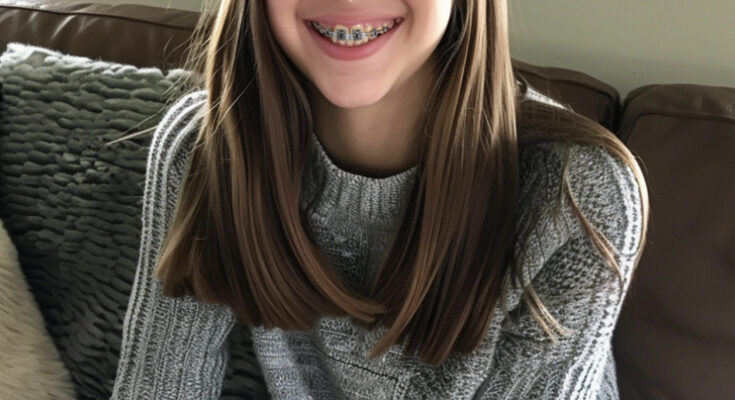I never thought I’d find myself in this situation. I’ve raised my own children, watched them grow into adults, and now I’m a grandmother. My heart is full of love for my little granddaughter, Emma. She’s a sweet, bright 14-year-old girl with a contagious laugh, a curiosity that often leads to endless questions, and a gentle nature that makes her the center of attention in any room she walks into. But recently, something has been bothering me, something that I just can’t seem to shake off.
A few months ago, my son and daughter-in-law decided that Emma needed braces. Yes, her teeth weren’t perfect. They were crooked, but they didn’t seem like a problem to me. As I look back on my own life, I remember my teeth—crooked and uneven. But I managed just fine. I had friends, I went out on dates, I even kissed a few boys, and my teeth never got in the way of anything. In fact, I sometimes wonder if my imperfections made me feel a little more human, a little more relatable. I wasn’t perfect, but I was happy.
So when my son and daughter-in-law told me they were going to put Emma in braces, I couldn’t believe it. She’s only 14! She’s still growing, still developing, and to me, the decision seemed more about vanity than anything else. Yes, her teeth weren’t straight, but they didn’t need to be. I didn’t want to come across as critical, but the idea that they were pushing her into something that I felt wasn’t necessary made my heart ache. Wasn’t it enough for her to be happy and healthy?
And so, the braces went on. The moment I found out, my stomach turned. I watched Emma sit in the dentist’s chair, wide-eyed and nervous. She was brave, don’t get me wrong, but I could tell she wasn’t thrilled about it. I remember her telling me, “Grandma, it’ll be fine. It’s just something I have to do.” Her voice was so small, so unsure, but she smiled, trying to reassure me.
And then, the weeks that followed. The discomfort, the frustration. She had to wear those metal brackets in her mouth all day, every day. It made me sad to watch her struggle through it, and I couldn’t help but wonder, was it worth it? Would her life really be that much better with straight teeth?
At first, Emma seemed to take it in stride. She never complained, but she didn’t look happy either. She still smiled, still laughed, but something in her eyes was different. And then there were the comments—comments from other kids at school. I heard about it through my daughter-in-law, who told me that some of Emma’s classmates had started to tease her about her braces. Kids can be cruel, and I feared that this would just be the beginning. Would they continue to pick on her as her treatment went on?
Emma told me, “It’s okay, Grandma. They’re just joking.” But I could see the way her face dropped when she said it. There was an unease in her voice that made me worry. I wanted to reach out to her, to tell her it would all be okay, but I wasn’t sure how. I didn’t want to make her feel worse, but I also didn’t want her to feel like she had to endure this discomfort for the sake of “perfect” teeth. I thought about how I grew up, how I had crooked teeth and I never felt like I was any less of a person. So, why was Emma going through this? Why was my son and daughter-in-law pushing her into something that seemed so unnecessary to me?
And then, there was the matter of boys. I know this might sound trivial, but it’s something I can’t help but worry about. Emma is at that age when she’s beginning to think about relationships, when she’s starting to see boys in a different light. The awkwardness of braces—how would that affect her? I could remember how self-conscious I was when I was younger. What if Emma ended up feeling the same way? What if the braces made her feel less confident, less attractive? How would she ever kiss a boy with braces in the way? It seemed like a lot for a young girl to navigate.
I wanted to talk to her about it, to offer her comfort, but I wasn’t sure how. She always seemed to brush it off, saying she was okay. But deep down, I couldn’t help but wonder if she truly was. Was she really okay with this decision? Or was she just saying what everyone else wanted to hear?
The more I thought about it, the more I became convinced that I needed to do something. My heart ached for Emma, and I didn’t want to watch her go through years of discomfort, teasing, and self-doubt all for the sake of a cosmetic change. I thought back to my own experiences, my own crooked teeth, and the fact that I had never felt less loved or less worthy because of them. Why couldn’t Emma just live with her teeth the way they were? I couldn’t believe that my son and daughter-in-law couldn’t see the bigger picture. Wasn’t her happiness and comfort more important than achieving some idea of “perfection” that didn’t even matter in the grand scheme of things?
So, I decided to take matters into my own hands. I planned to take Emma to the doctor, without telling her parents. I knew it was risky, but I couldn’t bear the thought of her suffering in silence. I wanted to get a second opinion, to see if removing the braces was an option. Maybe there was another way, some solution I hadn’t thought of. I couldn’t help but think that if Emma didn’t have to endure the pain and the teasing, she might feel better about herself.
The morning I decided to take action, I called Emma and told her we were going to go out for a special day—just the two of us. She seemed happy, excited even, and I tried not to let on that I had something more serious planned. I didn’t want to make her nervous or suspicious. I wanted her to feel like it was just another day out with Grandma, nothing out of the ordinary.
As we drove to the office of the dentist I had found—one who was highly recommended but hadn’t treated Emma before—I couldn’t help but feel a sense of guilt. Was I doing the right thing? I wasn’t sure, but I knew that I had to try. If Emma was unhappy, if she was feeling uncomfortable and unsure, then I had to be the one to help her.
When we arrived, Emma looked a little confused. “Grandma, I thought we were just going out to have some fun,” she said, a hint of suspicion in her voice.
I smiled gently, trying to ease her mind. “We are, honey. We’re just going to check on your teeth, make sure everything’s going well.”
She gave me a puzzled look but said nothing more as we walked inside. The dentist’s office was calm and welcoming, and the staff was warm and friendly. I sat beside Emma as she went through the consultation. The dentist was kind, asking Emma questions about her braces and her experience. After a thorough examination, he turned to me, his expression serious.
“I can see that Emma has been doing well with her braces,” he said. “But there’s no reason she couldn’t have a more relaxed treatment plan. We could explore some options to make the process less uncomfortable and perhaps even speed it up.”
I felt a small sense of relief. The doctor wasn’t pushing for more treatments or a longer period with braces. Instead, he suggested alternatives that might reduce Emma’s discomfort and address her needs without putting her through unnecessary pain or inconvenience.
When the consultation was over, I took Emma’s hand and led her out of the office. She looked up at me, still confused. “Grandma, what was that all about? Why did we go to the dentist without telling Mom and Dad?”
I smiled gently at her, brushing a strand of hair away from her face. “Honey, I just wanted to make sure you were okay. You don’t have to do anything you’re not comfortable with. If you feel that braces are too much, we can talk to your parents about it. You don’t have to suffer in silence.”
Emma’s eyes filled with emotion. “I thought I was supposed to be okay with it, Grandma. I didn’t want to disappoint anyone.”
I hugged her tightly, feeling my heart break for her. “You could never disappoint me, sweetie. It’s your happiness that matters the most.”
In the days that followed, I spoke to my son and daughter-in-law about what had happened. I was nervous, but they took it better than I expected. They were open to hearing Emma’s feelings and agreed to explore the doctor’s suggestions. It wasn’t the perfect resolution, but it was a start.
As for Emma, she’s happier now. The weight of those braces doesn’t seem so heavy anymore, and she knows that her feelings matter. She might still face the occasional teasing, but I know she’s stronger now, more confident in herself and her choices. And maybe, just maybe, she’ll never have to worry about kissing with braces in the end. After all, love and self-worth don’t depend on perfect teeth.


